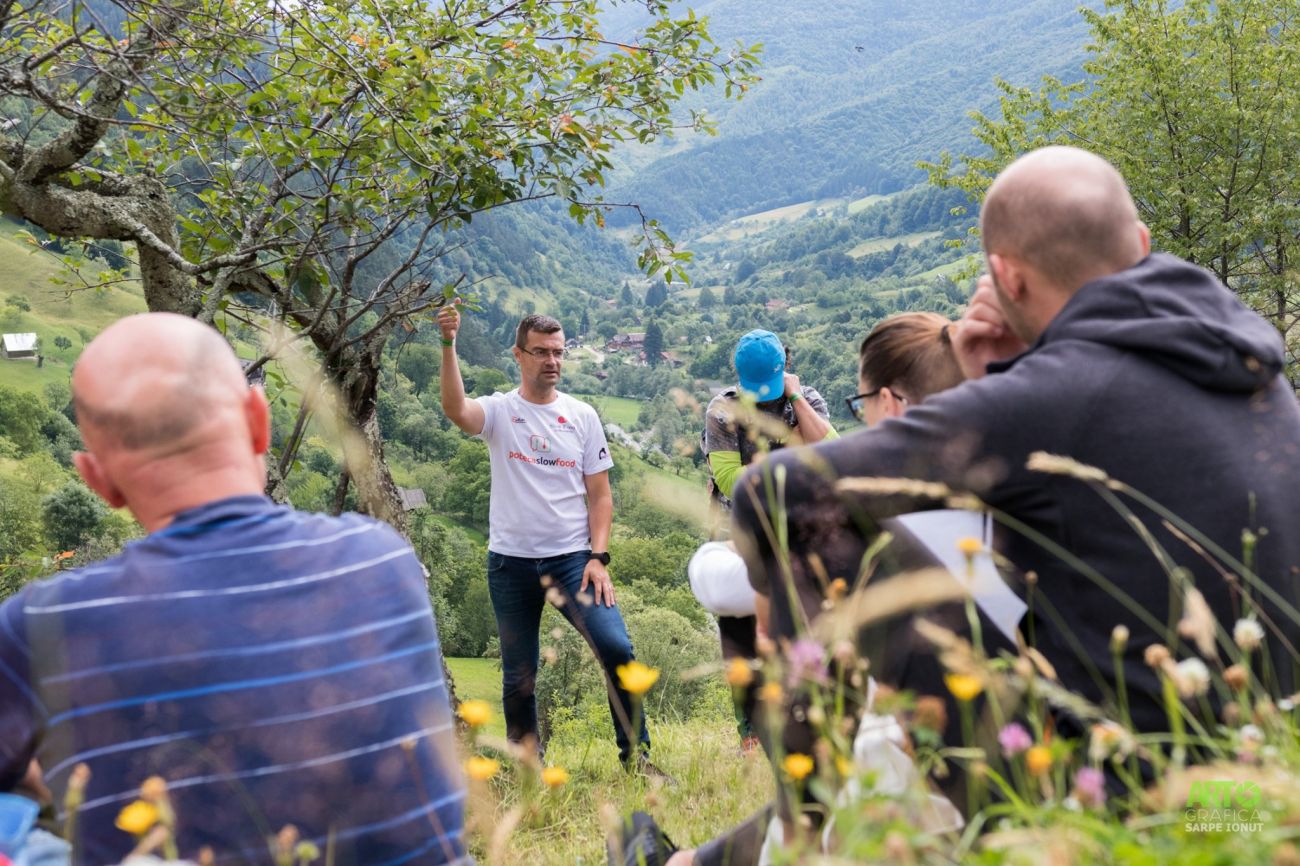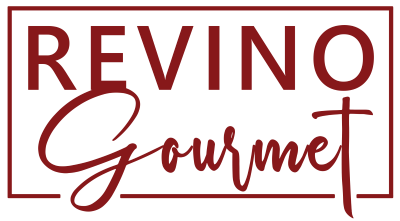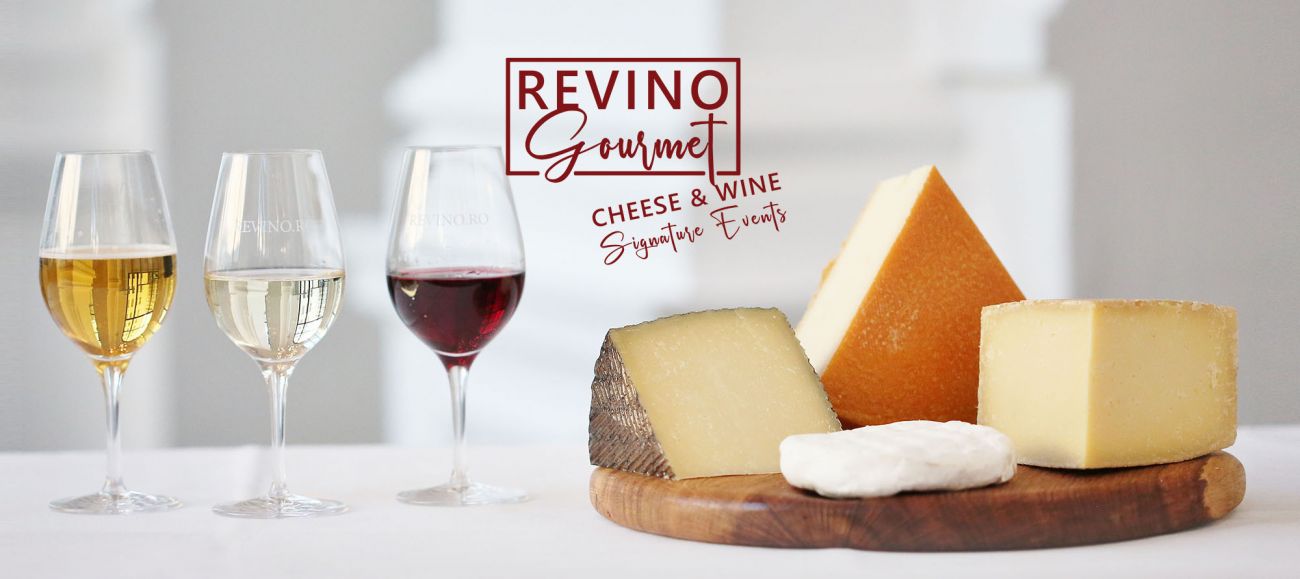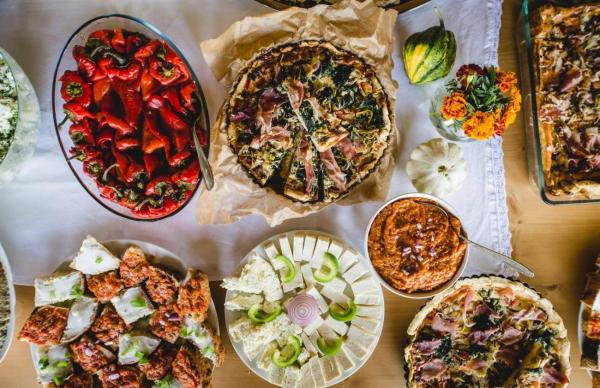
Cristian Cismaru is one of the most renowned promoters of culinary tourism in Romania, founder of Slow Food Sibiu, as well as a tourist guide, tourism entrepreneur, and co-founder of the My Transylvania Association. For over 15 years, Cristian has been organizing culinary events, with Transilvanian Brunch being one of the most well-known.
Where did your passion for promoting the villages of Transylvania come from?
I started my activity in the mid-90s as a cultural guide in Sibiu and southern Transylvania. From my numerous visits to the villages, I realized that many elements related to built or intangible heritage could only be preserved if there was a community to protect and carry them forward. This is how I came to direct many visitors towards small villages that seemingly had no mainstream tourist attractions but offered an authentic visiting experience.
How did you start promoting the culture, gastronomy, and history of Romanian villages, and what inspired you to initiate the Transilvanian Brunch project?
Transilvanian Brunch emerged from the desire to bring the rural gastronomic culture to the attention of both foreign and Romanian visitors. Initially as an attraction with a promotional role and then as a local development tool. In the process of producing and preparing food, many people who did not know how to adequately present the fruits of their labor were usually involved. By cooking with local communities, we tried to offer them a perspective on starting an ecotourism activity. Partially, these events also helped initiate and create many local experience offers.
What were the main challenges and successes you encountered in expanding the initiative beyond the Saxon localities of Transylvania and across almost the entire country?
The social structure you work with in the villages when organizing an event differs from one region to another. In Transylvania, we started with rearranging a wedding menu into a brunch format, working with neighborhoods. In other areas, it was necessary to discover the working method when preparing a large meal with many old recipes or less-used ingredients. We learned our organizational method both on the culinary side and the aspects related to discovering the place through guided tours or craft workshops by inviting communities to already existing events. Applied learning, meaning those from other areas were volunteers at events already taking place.
What resources are needed to organize events like Transilvanian Brunch, and how profitable are these events?
Transilvanian Brunch events are self-financed through the donation paid by each participant, but they are not designed to generate profit in their initial phase when promoting a village. The necessary resources include logistics (tables, benches, dishes, cutlery), human (local cooks, gathering old recipes, preparation, and testing), and promotion. Visitors need to be attracted to places where they wouldn't usually think of spending a day. After 1-2 years of promotion with these events, local hosts can organize themselves to reproduce the event adapted to their specifics and generate profit. But this only after they become a bit known and position themselves as an alternative ecotourism offer in the rural environment.
What were the main challenges you encountered at the beginning of organizing brunches, especially in areas where there were no local aggregators? How do things work now?
Between 2008-2015 there were almost no local aggregators. Everything was at the beginning; each village needed guidance and actual work on-site. Now things have radically changed, and there are many active communities through local NGOs, involved mayors, or producers who gather active people around them.
How has the Transilvanian Brunch concept evolved from its beginnings to the present, and what new elements have you added to the events' structure? What about Slow Food Sibiu?
The event has evolved through various small improvements. From making reservations by phone to online automation, increasing volunteer experience from different regions, and standardizing the event format. Each brunch has 2 hours of culinary part, 2 hours of hiking/walking to learn about local culture and get some exercise, and 2 hours of workshops to get in touch with local crafts and trades. Slow Food has somewhat mentored us throughout the process, providing us with theoretical foundations and practical training to understand the role of food in sustainable development.
.jpg)
You have mentioned in many interviews that gastronomy is important for tourism. Why do you consider this?
There are two reasons why gastronomy contributes to slow tourism as we want it. Food is indispensable; we all eat two or three times a day, so why not make it a pleasant moment of connection with the local community? Plus, we spend money daily to eat, so it's good for this financial effort to benefit those working in local agriculture, preserving the specifics. Moreover, food unites. Taste needs no translation and brings people around the table where stories can captivate us or give us an insight into the lives of those we visit.
What are the main economic and social benefits of promoting local gastronomy in Romanian villages?
Here a more complex answer is needed, so I will detail a bit. The benefits are economic, related to health, and especially to the community. Three major advantages we bring if we decide daily to consume local, seasonal products from our small producers are:
- By buying locally, we directly support the preservation of local plant varieties, seeds, and animal breeds, that is, the remarkable biodiversity we have in almost all regions of the country. In this way, we also preserve our old and good tastes against the standardization and fading of known flavors. We already almost all eat the same bland yogurt, from Ireland to Turkey, with an overdose of sugar and no local ferment cultures.
- Then, by eating locally, we usually support small-scale production versus industrialized agrofood. Practicing this type of agriculture indirectly ensures the preservation of the cultural landscape, in other words, the way the space between our villages or the alpine areas looks. Where we still enjoy the moment when we see pastures, haystacks, flower-filled meadows, orchards, etc. Food thus has, without us knowing, a pronounced aesthetic component. As the saying goes, "beautiful in use and useful in beauty!"
- Food is unfortunately a cause but at the same time a solution against climate change. You can honestly say you are an environmental activist if you buy locally. Firstly because the best-adapted varieties are the local ones, meaning they have the least impact on the territory because they emerged from existing conditions and do not need all sorts of chemical aids. Secondly, knowing the way food is produced creates a stronger bond with nature. Therefore, we begin to respect more the seasonality and lack of artificially obtained ingredients. Not least, the CO2 footprint is very small if the effort and energy consumed on transport logistics or the need for long-term storage of products are absent.
What methods did you use to familiarize locals from different regions with the brunch concept and how did you prepare them for organizing the events?
Familiarizing with any new concept that leads to the emergence of an ecotourism offer is difficult. Our way of doing this was through learning by doing. That is, we often explain the concept after dividing practical tasks. Locals can see with their own eyes the result of their individual work at the event's time. The structure and framework created are shown to them when we put all its components together. After a joint exercise, most understand by themselves what the theoretical concept behind it is.
Can you tell us about your experience collaborating with various local communities and what lessons you learned from these interactions?
People are often simple, in the good sense of the word. The level of dialogue with each must be adapted to the culture or environment they come from, and they will deliver the best result as service providers when you intuit their qualities or skills. Thus, pressures through which they can feel intimidated or overwhelmed should be avoided. No one was born learned, and we learn a lot from each other. Mutual openness is needed, and the promotion goal facilitates this openness. The main lesson is that we are still searching for our local identity.
What impact have the Transilvanian Brunch events had on local communities and how have you measured their success?
In 17 years of organizing these brunches, we have reached over 671 villages, had over 4,000 volunteers, and double the number of hosts, around 8,000. Each village is different, and that delights us. We measured success by two indicators: how many people continue the joint work? Meaning how many locals decide to offer a new type of service in the ecotourism field. We are at about 19 percent, so there is still a lot of work to do! The second indicator refers to how many people we convinced to move to the countryside in the villages included in our program. Until the pandemic, the percentage was 0, now we can no longer measure it well, but the tendency to move is evident.
How do you manage to maintain the authenticity and quality of the experiences offered at Transilvanian Brunch, regardless of the region where the events take place?
Authenticity is provided by the communities we reach. And it doesn't always succeed well from the beginning; it is a process of self-discovery and finding our roots. A process that must bring us all to the present, meaning to have attractive, sellable offers that ensure local development. There is still much work to be done!
Revino Team
22/06/2024






.jpg)









